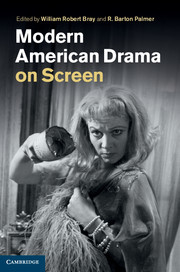Description
Modern American Drama on Screen
Coordinators: Bray William Robert, Palmer R. Barton
Focusing on key texts, leading scholars explore how Hollywood has given an enduring life to the classics of Broadway theater.
Language: English
Modern American Drama on Screen
Publication date: 08-2013
313 p. · 15.9x23.4 cm · Hardback
Publication date: 08-2013
313 p. · 15.9x23.4 cm · Hardback
Modern American Drama on Screen
Publication date: 09-2016
Support: Print on demand
Publication date: 09-2016
Support: Print on demand
Description
/li>Contents
/li>Biography
/li>
From its beginnings, the American film industry has profited from bringing popular and acclaimed dramatic works to the screen. This is the first book to offer a comprehensive account, focusing on key texts, of how Hollywood has given a second and enduring life to such classics of the American theater as Long Day's Journey into Night, A Streetcar Named Desire and Who's Afraid of Virginia Woolf? Each chapter is written by a leading scholar and focuses on Broadway's most admired and popular productions. The book is ideally suited for classroom use and offers an otherwise unavailable introduction to a subject which is of great interest to students and scholars alike.
Introduction R. Barton Palmer and William Robert Bray; 1. Realism, censorship, and social promise of Dead End Amanda Klein; 2. Screening Our Town (1940): or the problem of 'looking at everything hard enough' David Eldridge; 3. Screening Death of a Salesman: Arthur Miller's cinema and its discontents R. Barton Palmer; 4. Elia Kazan's A Streetcar Named Desire William Robert Bray; 5. Come back, little Scopophile: William Inge, Daniel Mann, and cinematic voyeurism John S. Bak; 6. The Big Knife: Hollywood's 'fable about moral values and success' Christopher Ames; 7. Adapting Lorraine Hansberry's sociological imagination: race, housing, and health in A Raisin in the Sun Martin Halliwell; 8. The Children's Hour Neil Sinyard; 9. Screening Long Day's Journey into Night Mary F. Brewer; 10. Who's Afraid of Virginia Woolf? David Lavery and Nancy McGuire Roche; 11. Sex, lies, and independent film: realism and reality in Sam Shepard's Fool for Love Annette Saddik; 12. Actor, image, action: Anthony Drazan's Hurlyburly (1998) Laurence Raw; 13. David Mamet brings film to Oleanna Brenda Murphy; 14. To what end Wit? John D. Sykes, Jr; 15. Theatrical, cinematic, and domestic epic in Tony Kushner's Angels in America (on stage and screen) Tison Pugh; Filmography.
William Robert Bray is Professor of English at Middle Tennessee State University. He is the founding editor of the Tennessee Williams Annual Review and the founding director of the Tennessee Williams Scholars Conference. He is the author of Tennessee Williams and his Contemporaries (2008) and (with R. Barton Palmer) Hollywood's Tennessee: The Williams Films and Postwar America (2009).
R. Barton Palmer is the Calhoun Lemon Professor of Literature at Clemson University, South Carolina, where he also directs the Film Studies program. He is the author, editor or general editor of more than 40 volumes on various literary and cinematic subjects, and a leading figure in the field of adaptation studies. Among other publications in this area, Palmer is the editor of two previous volumes for Cambridge University Press: Nineteenth-Century American Fiction on Screen (2007) and Twentieth-Century American Fiction on Screen (2007).
R. Barton Palmer is the Calhoun Lemon Professor of Literature at Clemson University, South Carolina, where he also directs the Film Studies program. He is the author, editor or general editor of more than 40 volumes on various literary and cinematic subjects, and a leading figure in the field of adaptation studies. Among other publications in this area, Palmer is the editor of two previous volumes for Cambridge University Press: Nineteenth-Century American Fiction on Screen (2007) and Twentieth-Century American Fiction on Screen (2007).
© 2024 LAVOISIER S.A.S.




